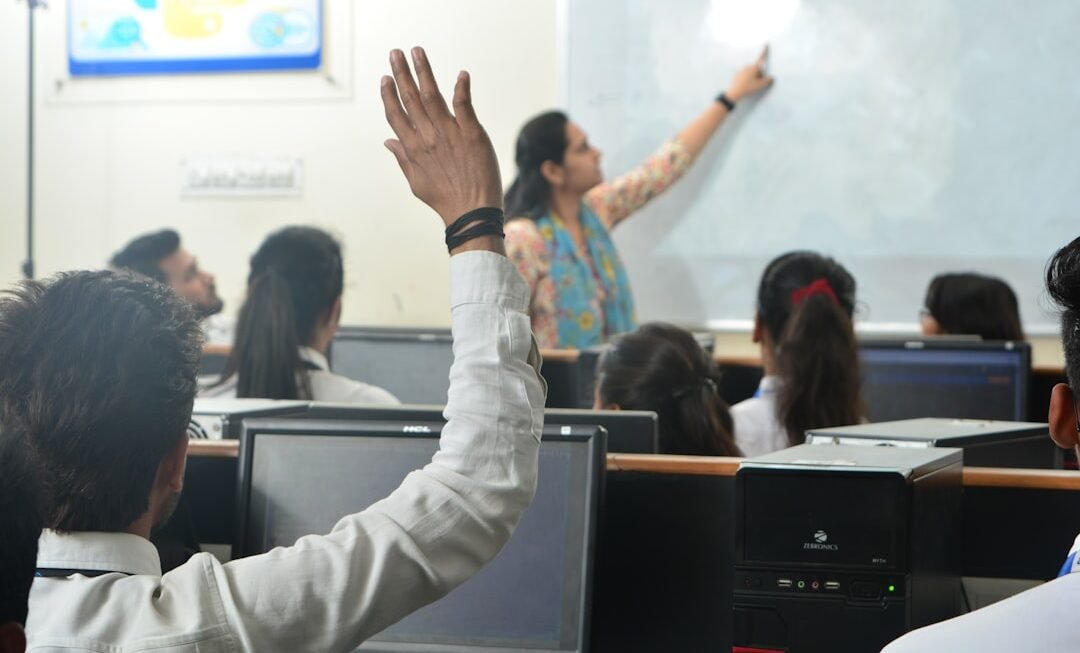The transition from traditional education to online teaching has been a profound journey for many educators, marked by both challenges and opportunities. For years, the classroom was a physical space where teachers and students interacted face-to-face, fostering relationships that were built on personal connections and immediate feedback. However, the advent of technology and the increasing demand for flexible learning options have catalyzed a shift towards virtual classrooms.
This transformation was not merely a change in location; it represented a fundamental rethinking of pedagogical approaches, necessitating educators to adapt their teaching styles to suit a digital environment. The initial foray into online teaching often felt daunting, as educators grappled with unfamiliar platforms and the nuances of engaging students through a screen. Yet, this journey also sparked a sense of innovation, as many teachers began to explore new ways to connect with their students, utilizing multimedia resources and interactive tools that were previously unavailable in traditional settings.
As educators navigated this new landscape, they discovered that online teaching offered unique advantages that could enhance the learning experience. The flexibility of virtual classrooms allowed for a more personalized approach to education, enabling teachers to tailor their lessons to meet the diverse needs of their students. This adaptability was particularly beneficial for learners who thrived in non-traditional environments or who faced challenges in conventional classroom settings.
Moreover, the global reach of online education opened doors to diverse perspectives and collaborative opportunities that transcended geographical boundaries. Educators began to realize that this shift was not merely a response to necessity but an opportunity to redefine their roles as facilitators of learning in an increasingly interconnected world. The journey from traditional education to virtual classrooms has thus been one of resilience and reinvention, paving the way for a new era in teaching and learning.
Overcoming Challenges: How These Educators Adapted to the Online Teaching Environment
Overcoming the Technological Divide
The transition to online teaching presented numerous challenges that required educators to be resourceful and resilient. One of the most significant hurdles was the technological divide; not all students had equal access to reliable internet or devices capable of supporting online learning. Educators quickly recognized the importance of equity in education and sought creative solutions to bridge this gap. Many teachers implemented strategies such as providing recorded lessons for students who could not attend live sessions or creating resource packets that could be distributed physically.
Adaptability and Digital Literacy
This adaptability not only demonstrated their commitment to student success but also fostered a sense of community among learners who were navigating similar obstacles. Furthermore, educators had to develop new skills in digital literacy, learning how to effectively use various online platforms and tools to create engaging content that would resonate with their students. By doing so, they were able to create a more inclusive and supportive learning environment.
Addressing the Emotional Toll of Teaching in Isolation
In addition to technological challenges, educators faced the emotional toll of teaching in isolation. The absence of face-to-face interactions made it difficult for teachers to gauge student engagement and understanding, leading to feelings of uncertainty and frustration. To combat this, many educators turned to innovative methods of communication, utilizing breakout rooms for small group discussions or incorporating interactive polls and quizzes to maintain student involvement. They also prioritized building relationships with their students by checking in regularly and creating virtual spaces for informal interactions.
A Renewed Sense of Purpose and Commitment
This emphasis on connection helped mitigate feelings of isolation for both teachers and students, fostering a supportive online learning environment. Through perseverance and creativity, educators not only overcame these challenges but also emerged with a renewed sense of purpose and commitment to their craft.
Embracing Innovation: Transforming Teaching Methods and Practices for Online Learning
The shift to online teaching necessitated a radical transformation in teaching methods and practices, prompting educators to embrace innovation like never before. Traditional lecture-based approaches gave way to more dynamic and interactive formats that leveraged technology’s potential. Educators began incorporating multimedia elements such as videos, podcasts, and interactive simulations into their lessons, enriching the learning experience and catering to various learning styles.
This shift not only made lessons more engaging but also encouraged students to take an active role in their education, fostering critical thinking and problem-solving skills. By reimagining their instructional strategies, educators were able to create a more vibrant and stimulating online classroom environment that inspired curiosity and exploration. Moreover, the integration of collaborative tools facilitated peer-to-peer learning in ways that were previously unimaginable.
Platforms like Google Classroom, Zoom, and Microsoft Teams allowed students to work together on projects in real-time, regardless of their physical location. This collaborative spirit not only enhanced academic outcomes but also nurtured essential social skills that are vital for success in the modern world. Educators also began experimenting with flipped classroom models, where students engaged with instructional content at home and utilized class time for discussion and application of knowledge.
This innovative approach empowered students to take ownership of their learning while allowing teachers to provide targeted support where it was most needed. The embrace of innovation in online teaching has thus transformed educational practices, equipping both educators and students with the tools necessary for success in an ever-evolving digital landscape.
Impacting Students: Inspiring Stories of Academic Success and Personal Growth
The impact of online teaching extends far beyond academic achievement; it has also played a pivotal role in fostering personal growth among students. Many educators have witnessed remarkable transformations in their learners as they adapted to the challenges of virtual education. For instance, some students who previously struggled with anxiety in traditional classroom settings found solace in the online environment, where they could engage at their own pace without the pressure of immediate social interactions.
This newfound comfort allowed them to participate more actively in discussions and take risks in their learning journey. Educators have shared inspiring stories of students who blossomed academically and personally during this time, discovering strengths they never knew they possessed. Additionally, online teaching has provided opportunities for students to explore their interests beyond the confines of a standard curriculum.
With access to a wealth of online resources and communities, learners have been able to pursue passions ranging from coding and digital art to environmental activism and entrepreneurship. Educators have embraced this spirit of exploration by encouraging students to undertake independent projects or participate in virtual clubs that align with their interests. These initiatives not only fostered a sense of agency among students but also cultivated essential skills such as self-discipline, time management, and collaboration.
The stories of academic success intertwined with personal growth serve as powerful reminders of the resilience and potential inherent in every student, highlighting the transformative power of education—whether delivered in person or online.
Balancing Work and Life: How Online Teaching Provided Flexibility and Fulfillment
One of the most significant advantages of online teaching has been the flexibility it offers educators in balancing their professional responsibilities with personal life commitments. For many teachers, the rigid structure of traditional schooling often left little room for personal pursuits or family time. However, the shift to virtual classrooms has allowed educators to create schedules that better align with their individual needs and lifestyles.
This newfound flexibility has enabled them to engage more meaningfully with their families while still fulfilling their professional obligations. Many educators have reported feeling more fulfilled as they navigate this balance, finding joy in both their teaching roles and personal lives. Moreover, the ability to work from home has led many educators to reevaluate their approaches to self-care and well-being.
With reduced commuting times and increased autonomy over their work environments, teachers have been able to prioritize activities that promote mental health and overall wellness. Whether it’s taking breaks for exercise, engaging in hobbies, or spending quality time with loved ones, this balance has contributed positively to their effectiveness as educators. The flexibility inherent in online teaching has not only enhanced job satisfaction but has also fostered a culture of well-being among educators who recognize the importance of maintaining a healthy work-life balance.
As they continue to navigate this evolving landscape, many teachers are committed to preserving this newfound equilibrium even as they adapt back into more traditional settings.
Professional Development: How Online Teaching Helped Educators Expand Their Skills and Expertise
Embracing Change and Growth in Education
The shift to online teaching has been a driving force behind the professional development of educators, prompting them to expand their skills and expertise in unforeseen ways. As they adapted to new technologies and pedagogical approaches, many teachers found themselves engaging in continuous learning opportunities that enriched their professional practice. Online workshops, webinars, and collaborative forums became invaluable resources for educators seeking to enhance their digital literacy and instructional strategies.
Collective Growth and Community Building
This commitment to professional growth not only benefited individual teachers but also contributed to a collective elevation of educational standards within their institutions. Furthermore, the necessity for collaboration among educators during this transition fostered a sense of community that transcended geographical boundaries. Teachers began sharing best practices, resources, and innovative ideas through social media platforms and professional networks, creating a rich tapestry of knowledge that could be accessed by all.
Developing New Areas of Expertise
This collaborative spirit has led many educators to develop new areas of expertise—whether it be mastering specific educational technologies or exploring innovative assessment methods tailored for online environments. As they continue on this path of professional development, educators are not only enhancing their own capabilities but are also better equipped to support their students’ diverse learning needs in an increasingly digital world.
A Brighter Future for Education
By embracing the opportunities presented by online teaching, educators are shaping a brighter future for education. As they continue to grow and develop, they will be better equipped to meet the evolving needs of their students and institutions, ultimately leading to a more effective and inclusive educational system.
The Future of Education: How These Educators Are Shaping the Next Generation of Online Learning
As we look toward the future of education, it is clear that the experiences gained during the transition to online teaching will shape the next generation of learning environments. Educators who have navigated this journey are now equipped with invaluable insights into effective online pedagogy that can inform future practices across various educational settings. Their experiences have highlighted the importance of flexibility, adaptability, and innovation—qualities that will be essential as education continues to evolve in response to societal needs and technological advancements.
These educators are not merely participants in this transformation; they are pioneers who are actively shaping the future landscape of education. Moreover, the lessons learned from online teaching have underscored the significance of fostering inclusive learning environments that prioritize equity and accessibility for all students. As educators advocate for policies that support diverse learners—regardless of their backgrounds or circumstances—they are paving the way for a more equitable educational system that values every student’s potential.
The future of education will likely see an increased emphasis on personalized learning experiences that leverage technology while maintaining meaningful human connections. As these dedicated educators continue to innovate and inspire change within their communities, they are laying the groundwork for a future where education is not only accessible but also transformative—empowering learners around the globe to thrive in an ever-changing world.












